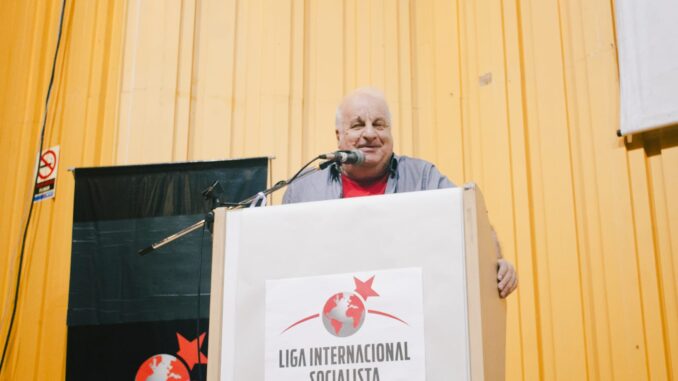Franco Grisolia: “This is the most serious project of international regrouping”
Taking advantage of your visit to Argentina, we interview Franco Grisolia, leader of the PCL of Italy and the International Trotskyist Opposition (DONE). He came to participate in the meeting of the expanded executive committee of the LIS and then was a speaker at an internationalist event at the Faculty of Social Sciences of the UBA.. We talked with him about previous experiences and also about current events.
interviewed: Sergio Garcia
Franco, Tell us your conclusions about the LIS meetings
My conclusions are enthusiastic, to put ourselves as a small Trotskyist current in a broader framework of Trotskyists who truly fight for the refoundation of the international. I found the debate very rich., deep. I don't want to say that there are no problems; there are. But I don't see any particularly essential. It was a good entry for our current within the framework of the LIS.
The framework of the meeting was the text of agreement LIS-OTI-L5I. What do you think of this regrouping policy??
I think it is essential, because for decades the Trotskyist vanguard dedicated itself to dividing. There were some attempts at regrouping in the previous stage, but now it seems to me that this is the most serious project of international regrouping, that never existed in the vanguard. It is an essential element. Naturally, we must build ourselves in the class struggle. You cannot just think about regrouping and then taking power because there are many of us.; it doesn't work like that. But the premise of being able to enter the class struggle in a meaningful way is to regroup the revolutionaries because in recent decades they were divided, as opposed to joining. an element, a reference bridge, is to join forces to establish the perspective of solving the question of the political leadership of the labor movement, internationally and in each nation as well.
You asked to join the LIS a while ago and now it was accepted. How to follow?
I think we have to consolidate what we are doing together. We consider ourselves in the LIS, although our congress is in May, that theoretically and democratically, could decide to change. But the reality is clear, because there are no meaningful options or objections in our international. Political ties must be consolidated, like the colleagues from the L5I and Australia, I think it will be possible with both. I also see things that can be important to start a job in some countries where we are not. I think there are bases, There are some things that can end well if the work we started is possible.. For example, apart from L5I, see what reaction there is from the revolutionary sectors towards our development as an international current and see the situation in the United States, where you can regroup colleagues from different traditions and militancy in a significant section of the LIS.
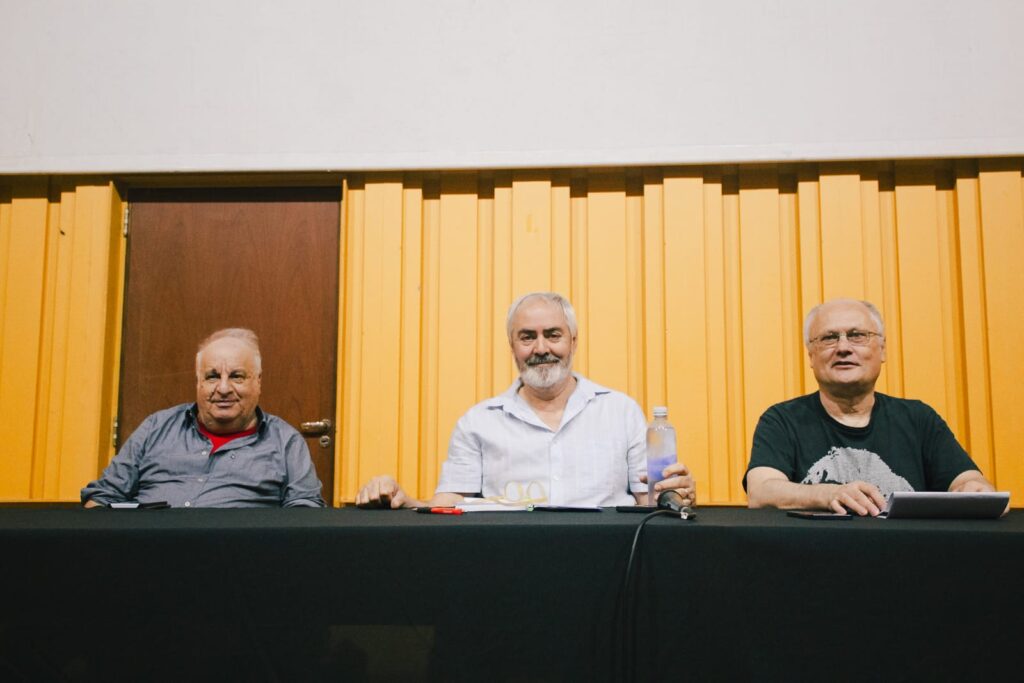
What were the origins of the OTI??
We were born from a first regrouping of small groups in 1979, around a split of a British organization, very hardworking, that came from a current of international Trotskyism. At one time it was quite an important trend, led by Gerry Healy, which only in Great Britain had some 2.000 real militants, many of them workers' delegates. But it was managed very bureaucratically by a kind of dictator, who was this Healy.
We try to start from the criticism of the failures of the other currents of Trotskyism, but at the same time of regrouping. In this frame, Along with the British there were three smaller groups: those of Italy, some 30 colleagues from the United States and a small group from Denmark. At that time there was the so-called International Liaison Committee between the Morenoist and Lambertist currents., We asked to enter but it was not accepted. Unfortunately, as happens in the Trotskyist movement, poor unification with another organization and other elements, contributed to a collapse of the English group. The strength that remained, very small, maintained the regrouping project.
We still did not consider that it was necessary to regroup around us, rather battle on some points with forces that were progressive within the framework of the Trotskyist movement. After the collapse of the British section we tried the SU, We present several alternative texts to the World Congress of 91, although we only had one delegate from Italy, which was me. We won some things, but at the end our section, who was an entryist in Rifondazione Comunista - an important split from the PC on the left -, In order not to give in to their leadership, we had to break with Mandelism and create our independent organization.: the OTI. The name comes from when we were a fraction in the SU.
At that moment we regrouped with the Argentine PO. We knew Altamira because I was briefly in Lambertism when the PO was there. We had thought about contacting the PO in the 84, 85, but we decided not to. First, because the PO was linked to the POR of Lora in Bolivia that, in the revolutionary situation of 1983, had a left-wing Menshevik attitude: the miners had broken into La Paz, They had guns and everything., but the POR said not to go for the seizure of power because “they did not understand the dictatorship of the proletariat”… And second, because in the first election after the dictatorship the PO tried to build an electoral front of the entire left, including the Intransigent Party, and to us it seemed almost like a popular electoral front.. Finally the OP showed up alone, but his moderate program to try that front seemed negative to us. That's why we choose SU. Ten years later there were new conditions: The PO had broken with the POR of Lora and there was no hypothesis of a popular electoral front. If you read texts from the PO or the current where Altamira continues, Labor Politics, They say that they took the initiative of international regrouping. It's not true: We were the ones who approached the PO and the 94 al 97 We promote the issue of the refoundation of the Fourth.
If you summarized the experience with PO, What political or method differences led to its end??
The catastrophic conception that the PO has of the situation of collapse of capitalism and the conditions of development of the class struggle. There was a contradiction, because I do not want to insult the theoretical level of apparent economic knowledge in particular of Altamira, but it wasn't that tall. In the leadership there was talk that the situation was one of collapse and that is why now a revolutionary wave is necessarily going to come.. It is an a-Marxist method, because there was no collapse and neither the collapse nor the development is linear..
A year passed, the collapse did not come, The wave did not come and instead of analyzing this they said “the collapse is going to come and there will be a wave.”. And when we said “you said it a year ago and it didn't happen” they didn't respond., because it was a permanent ideological line. For a moment they agreed to try on non-minimal bases, essential: recognition of the crisis of the old bureaucratically deformed workers' states, the fight for the dictatorship of the proletariat, the fight against popular fronts, transitional methods and objectives, essential things to try to regroup.
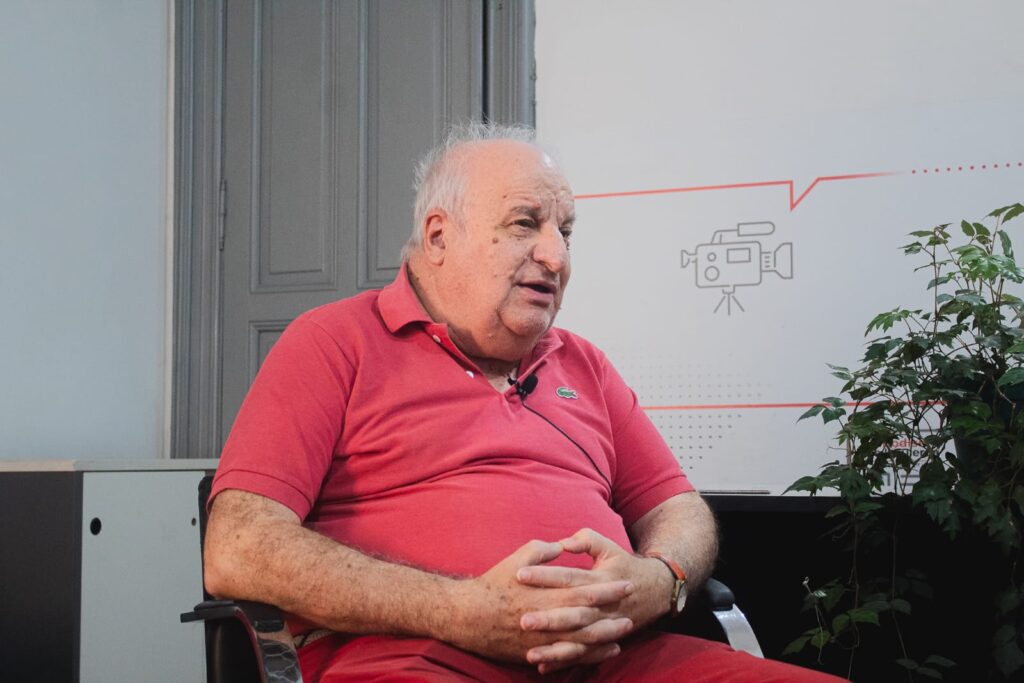
At first, when we regroup with the PO, there was a pretty strong greek group, with a few hundred companions; and a Turkish group, which had a more national development at the beginning of some Trotskyist individuals who were in France.
The relationship with some currents was very bad. For example with Lucha Obrera in France, or the CIO in Britain which had other sections. Everyone showed interest in a prospect of joining. And there was an immediate reflection from Altamira, who was considered a great leader, with capacity for psychological influence: “They are going to come join us”. But there really was a lie behind it. They said "yes", “You are going to stay at home.”, but when you finished eating they told you “there's the door”. We didn't get anywhere. The problem we faced all the time was Altamira's extreme personalism. At one point I had the passion to try new options to regroup the Trotskyists. At other times there was a null result because it took years to discuss abstractions. The Greek party had a very nice leader, Savas Matsas, more catastrophic than Altamira. He went so far as to say that “the hell of the revolution is tomorrow”. It surprises me that there are people who pass by 60 years and every day is the same: “the revolution is tomorrow”…
In 2004 We had a political debate that led to an international congress with delegates. There were limits, the translations, etc. But the OP came with a block, with acceptance of the other leaders. There was a central document from which six of us abstained and one colleague voted in favor. In our party there is never a CC in which there is not some vote against or abstention, maybe a little more than necessary, but that's how we are. The PO was all in block, but we put seven amendments, limit catastrophism, limit the meaning of political analysis. There was a real discussion and we abstained.
Altamira was the father-patron of the PO: what he wanted was done, what I didn't want wasn't done. On international issues, when he didn't feel safe, He had the position of doing nothing and waiting for new significant forces to come together, surprised by his great analytical capacity.. He never reacted by saying “get out.”, There is the door” nor did he threaten to kick us out.. But he directed the international organization in a Bonapartist and anarchic manner., because I didn't organize anything. In the PO, At the end of each discussion, Altamira spoke for two or three hours and in two seconds the text was corrected to include what he thought.. The PO comrades should now take into account that they left that framework because there was a personal defeat for Altamira in the primaries of the Left Front in 2015. It is not a very good thing for them to rebel when they defeat you...
After 2004 a period of non-functioning of the organizations developed, they existed formally. For a period the executive committee and a very restricted secretariat met but which was not the direction of anything in political activity.. Finally they never met again and only found companions of diverse experience.. We made the mistake of not rebuilding the OTI at that time, not to break but to say that since there is no democratic centralism as before, Let's participate in a broad discussion group that wants to bring together other people. Although with nuances, With the Greeks and the Turks we agreed on going to a new congress, with delegates and decide to eventually dissolve the democratic centralist format and resume a more fluid debate group. Finally, this didn't happen.
In 2017 Altamira was worried because we started arguing a little with the PTS, the Trotskyist Fraction in Europe, with similar positions against catastrophism. Altamira began to think that we were on the eve of uniting: “The Italians unite with the PTS”, and broke without any formal criteria. But it was total nonsense., we just just argue, We were never interested and in fact the PTS later organized a break in our organization. It was a total disaster, of the 60 militants that the FT of the PTS had in Italy are now maximum 15.
About Ukraine, with the FT there are quite a few differences. What is your opinion?
It's very strange. In fact, 15 O 20 years ago, We saw that there was no alternative in the PTS because it was an international fraction, not democratically centralized, with mother party and all its predictions as elements of unity. It did not correspond to our position because regrouping is a dynamic issue, in which different traditions confront each other, which must have clear political bases. It had some elements that could be similar: a non-catastrophic vision of the situation and an understanding of the process of capitalist restoration in China. But that understanding was blocked. The logic would have been that since 2013 Things would have gotten worse and China would become imperialist.. But it seems they were blocked, It could be because they are a sect that, there has come a point, there is nothing more to discuss. That's why they don't understand what's happening in the world.. Now, From a total theoretical incomprehension, they come to have positions that are contradictory to what should be a coherently revolutionary position.. That is why they do not take the right to self-determination of the Ukrainian people and have a lack of understanding of the development of the forces of the former workers' states as new powers and the limitation of the former imperialist states.. That is why they fetishize the role of the United States in relation to new imperialisms like Russia and China..
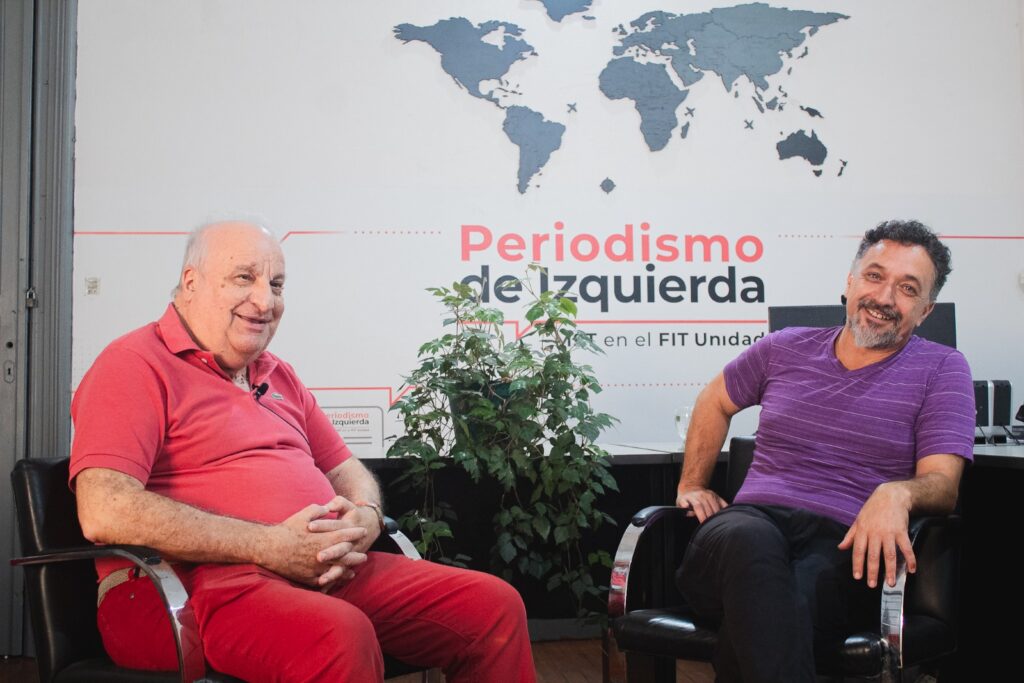
Did you also have discussions with the ITU?
A small minority of us tried to say we couldn't be alone. We had rebuilt the OTI with the Italians, the Americans, the danes, some english, we worked. We were a very small organization that wanted to see possibilities of unification and we discussed with several groups. This minority took a position of saying that there was a solution and it was the ITU, but most of us responded that we didn't think so because it is a morenista sectarian. We must have some differences about the history of Morenoism, but the LIS is not morenista sectarian. They are absolutely sectarian, a small organization that does not really want to build a Trotskyist regrouping, but on the basis of its Morenoist tradition and its own politics. With the ITU and the PTS we did not try anything, we only argue with our position. With the ITU we did it by accepting a proposal from that minority, democratically and to verify. There was a one-day meeting with Miguel Sorans and the result was very negative as a political position.
Now we are here in the LIS because we see that it is a revolutionary centralist organization and we are all willing to be a minority on one position or another.. The only previous experience of attempted unity was that of the PO, apart from the one we are trying to unify now, with the L5I and Russian comrades who are going through a lot of repression, I understand that if they were not involved in that repression, they would probably have decided to join the LIS as well., which is bigger, Democratic, who argues, that is not sectarian morenista in every aspect of history.
How is the rise of the extreme right expressed in Italy??
In Italy there is a far-right and right-wing government because Berlusconi's party is still there, right-wing liberal, which has an important position in the economy and television. We say that Meloni's party is a post-fascist party, a party that has features in fascism but today does not try to propose a perspective of a fascist or semi-fascist State. In that sense, behaves like a traditional conservative party. When Great Britain was still in the European Parliament, Meloni's party was in the same current as the British conservative party, a traditional right-wing party but not far-right.
Now there is the League, directed by Salvini, which is one of the four parties in this coalition. The room is more central, but very small, former Christian Democrats. Salvini does a bit of far-right demagoguery to get votes from Meloni. Six years ago they were stronger than Meloni, Then they entered a government led by a man from the European financial bourgeoisie, Draghi, former president of the European Bank, and of 30% they went to 10 while Meloni went from 4 a 30%. It was an unexpected thing, who took votes from everywhere. The majority of the percentage that lost that League went to Meloni.
At the moment there is nothing essential of a very strong attack, massive. What they do is cover non-payment of tax, but not directly as it was in previous right-wing governments: Entrepreneurs can take a few more years to pay, but there must be positive results for the banker or industrialist who does not pay for a year. For now there are no good results. They proposed a fiscal compromise, taking the average tax rates in the preceding years, reducing a little. But then there is no control. For a small and medium bourgeoisie sector, small industrial, it was good. Big businessmen don't like it so much: They do tax evasion in a more technical way.
It is clear that if you do not collect this tax money there is less for healthcare. They say they increased it, but not like inflation. They actually decreased it, It is an attack on public health. There are many people who have to pay to be served quickly, There are around five million Italians who will no longer be served. The second thing is what they call autonomy.. In Italy there is a unitary tradition, The southern regions are much poorer than the northern ones. This is why there are standard levels of state investment because there is very little local tax. Now the speech was to analyze the situation region by region, also depending on the taxes collected. But of course, richer regions can charge more taxes. That is why a law clearly stated that each period a discussion had to be held between the central government and the regions to receive what each one needed.. This is not said by Meloni but by the League, that in the face of their electoral disaster today they present themselves as Italian patriots. Their greatest influence is still the north and they want to use the administration to tell that petty bourgeoisie that they defend their interests., who have more resources, which may eliminate some regional fees.
Meloni has an electorate with greater national development and historically further south. Although he doesn't like it very much, He has to give some things to the League so that it supports its majority. That change ispremiered: Meloni and his party want to go from a parliamentary republic to a semi-presidential republic and they will elect the premier, the prime minister. Meloni looks like next. The Northern League doesn't like that, because he does not want to be under Meloni's direction all the time but that is the agreement. They have many difficulties because the Constitutional Court has already intervened in the autonomy law, arguing that half is unconstitutional. He says that the minimums must be set nationally first and from that point on, agreements cannot be made region by region.. Unions and left-wing parties call for a referendum, which in principle would be next spring. But they debate whether or not the autonomy law still exists. If the League does not achieve regional autonomy, he is not interested inpremiered.
The most dangerous thing the government has done so far is a law repressive of workers' struggles presented in parliament. Does not question the strike, but the pickets. They ran a campaign because there are ecological extremists in Italy, who put paint on monuments, etc. We defend all the pickets, of workers on strike or also some demonstration for Palestine. But if an ambulance passes, we let it pass. They chain themselves and say"we can't". It's a bit of an exaggeration., adventurer, We defend them but it's nonsense.
There are also union struggles calledof bases, which does not mean grassroots structure but rather independent and left-wing unions. They are firm in the logistics sector, where there are many migrant workers, Africans, Senegalese or Maghreb, abandoned by the large union organizations, with situations where the national collective agreement by branch does not apply. Some grassroots unions did good work and organized strong struggles. We participate and have colleagues in the major union and in several grassroots unions.. There are like a hundred, the largest with 50 thousand adherents and others with 500. The bosses don't like this., that's why they try to repress these struggles, the pickets, They increased the penalties and imposed very high fines. Before this law, hundreds of workers, rank and file unionists and also from CGIL have civil or criminal cases. With current legislation it can end in a fine or a maximum of six months with conditional imprisonment., with that proposal a heavy fine and imprisonment can be two years if it is the first time, the second another two years and you have to go to prison for four years. We have a pretty strong fight. The CGIL, which is the largest union that exists in Italy, spoke out against. Saturday 14 December there was a national demonstration in Rome. We build with small far-left organizations and other unions, as a current of the CGIL a united front against this. There are also more moderate sectors, the pacifists, the Catholics, the left, the caritas. The unitary demonstration brings us together, but we have a harder line on this issue.
I think this is the biggest danger.. Also reduce taxes on workers a little, a lot to the petite bourgeoisie and a lot to the bourgeoisie. Actually, the workers have about 40 euros more every month, but in health and services it costs hundreds of euros more each year and of course there is no future recovery from inflation. The government says“we take into account the workers and employees, “Unlike other governments, we give some things.”. There are people who believe it, but much less. Now the big problem in Italy for the working class is abstention, because there is a situation in which half of the workers are not going to vote. There is a total distrust in the center-left parties that were voted for in a majority by the workers, largely due to his actions in the government.
Franco, What is your message to the LIS militancy??
We are happy, because we did not know about the LIS until a year and a half ago. This is also important because other organizations say that since they have only known it for a year and a half, we have to wait three more years.. ¡No! We are revolutionaries, We found, we agree, in six months, one year, and progress is made in agreements and organization.
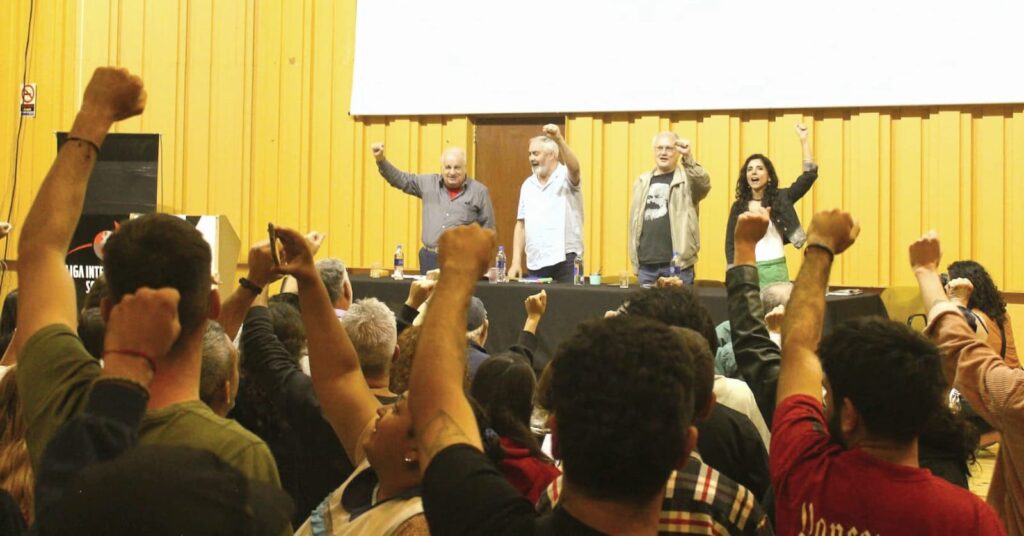
It was a surprise and we must say to the leaders and comrades of the LIS and the MST in particular that they did an extraordinary job., from a fundamental conception that is the regrouping to reconstruct a revolutionary international that can build over time an alternative leadership to direct the class struggle in the world. We recognized this. We are happy with this, we have equal methods. Now we have to work because our income, even though they are small, It's not like they come in 300 more in a country: it's more, because there is experience in different situations and countries. This is also the case if the L5I enters, which I think is highly likely. It is a reference point to understand that it is time to unite.
When we debated a year ago in Milan, We put four points that we believed were essential: the dictatorship for the socialist revolution; opposition to popular fronts and blocs with the bourgeoisie; the understanding that the world is divided between imperialist powers (you have to be flat earthers not to understand it, It is evident that there is a global confrontation between China and Russia on one side and the former imperialisms on the other., You can't say that maybe they are still workers' states); and the fourth point is the method of transitional demands.
It seems to me that in Argentina all organizations have that last position. It is the program of the Left Unity Front, there are temporary demands, there is the question of power, of the workers' government. In France there were very important struggles, with strikes, as for pensions, with a monumental government crisis, but none of the French organizations, Workers Struggle, the Mandelists and not the NPA, no one said a word about the workers' government.
We have to constantly propose the slogan of the workers' government. In Italy there is no leaflet from our party on the feminist or other issue that does not combine that to achieve this it is necessary to change society and a government of the workers.. But, places you as a political spectator. In France it is the tradition of LO. Rather, they say it as if it were a normal thing., that it is not their tradition to raise the question of power, even if it is propaganda. I consider it a major problem and a shame., because in France there are many Trotskyists but none of them understand this issue. Even less the mandelists, who say that the workers' government would be Mélenchon and ask him to please make some significant reforms...

